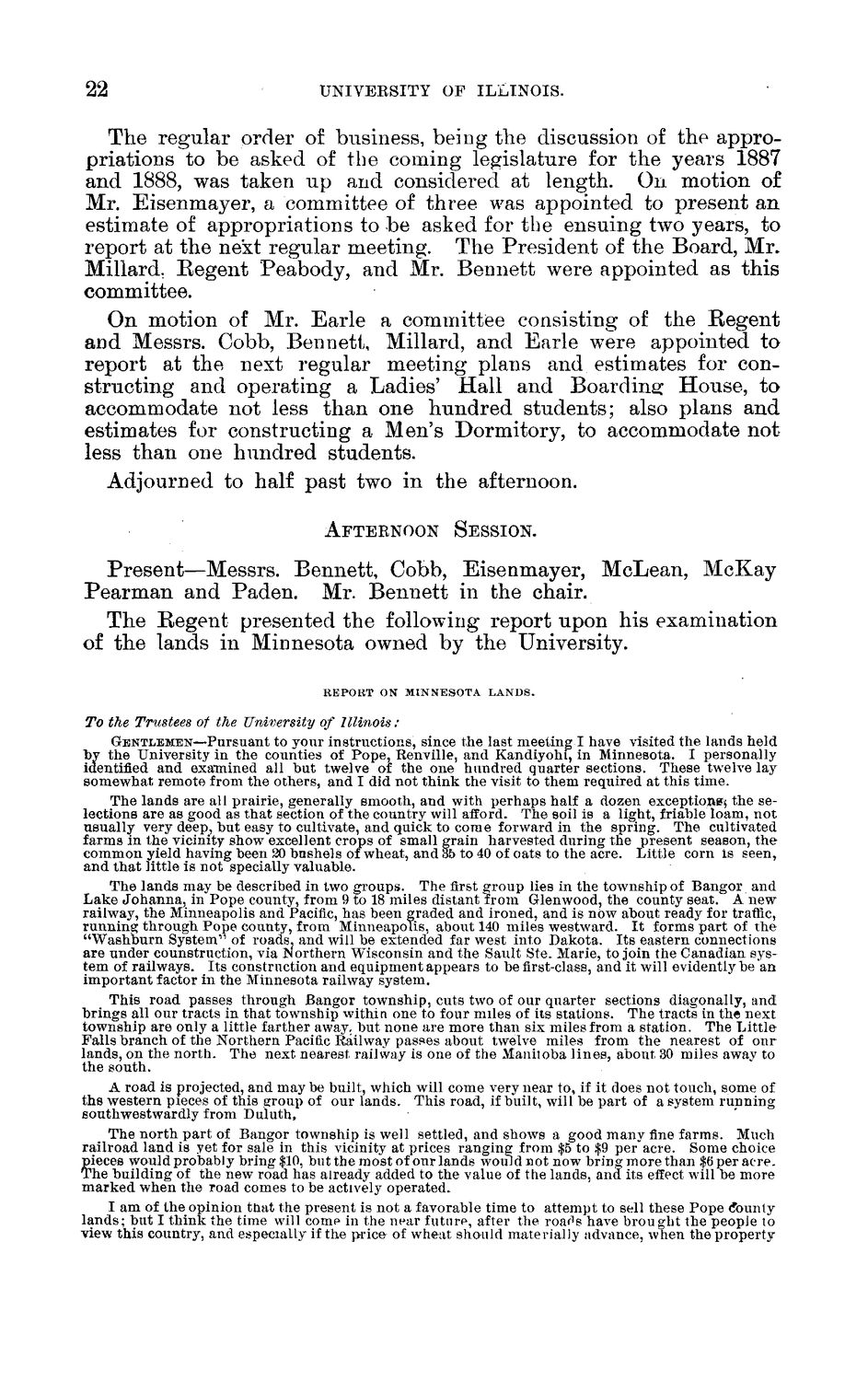| |
| |
Caption: Board of Trustees Minutes - 1888
This is a reduced-resolution page image for fast online browsing.

EXTRACTED TEXT FROM PAGE:
22 UNIVEESITY OF I L L I N O I S . The regular order of business, being the discussion of the appropriations to be asked of the coming legislature for the years 1887 and 1888, was taken up and considered at length. On motion of Mr. Eisenmayer, a committee of three was appointed to present an estimate of appropriations to be asked for the ensuing two years, to report at the ne'xt regular meeting. The President of the Board, Mr. Millard. Regent Peabody, and Mr. Bennett were appointed as this committee. On motion of Mr. Earle a committee consisting of the Regent and Messrs. Cobb, Bennett, Millard, and Earle were appointed to report at the next regular meeting plans and estimates for constructing and operating a Ladies' Hall and Boarding House, to accommodate not less than one hundred students; also plans and estimates for constructing a Men's Dormitory, to accommodate not less than one hundred students. Adjourned to half past two in the afternoon. AFTERNOON SESSION. Present—Messrs. Bennett, Cobb, Eisenmayer, McLean, McKay Pearman and Paden. Mr. Bennett in the chair. The Regent presented the following report upon his examination of the lands in Minnesota owned by the University. R E P O R T ON M I N N E S O T A L A N D S . To the Trustees of the University of Illinois: GENTLEMEN—Pursuant to your instructions, since the last meeting I have visited the lands held by the University in the counties of Pope, Renville, and Kandiyohi, in Minnesota. I personally identified and examined all but twelve of the one hundred quarter sections. These twelve lay somewhat remote from the others, and I did not think the visit to them required at this time. The lands are all prairie, generally smooth, and with perhaps half a dozen exception^ the selections are as good as that section of the country will afford. The soil is a light, friable loam, not usually very deep, but easy to cultivate, and quick to come forward in the spring. The cultivated farms in the vicinity show excellent crops of small grain harvested during the present season, the common yield having been 20 bushels of wheat, and 35 to 40 of oats to the acre. Little corn is seen, and that little is not specially valuable. The lands may be described in two groups. The first group lies in the township of Bangor and Lake Johanna, in Pope county, from 9 to 18 miles distant from Glenwood, the county seat. A new railway, the Minneapolis and Pacific, has been graded and ironed, and is now about ready for traffic, running through Pope county, from Minneapolis, about 140 miles westward. It forms part of the "Washburn System11 of roads, and will be extended far west into Dakota. Its eastern connections are under counstruction, via Northern Wisconsin and the Sault Ste. Marie, to join the Canadian system of railways. Its construction and equipment appears to be first-class, and it will evidently be an important factor in the Minnesota railway system. This road passes through Bangor township, cuts two of our quarter sections diagonally, and brings all our tracts in that township within one to four miles of its stations. The tracts in the next township are only a little farther away, but none are more than six miles from a station. The Little Falls branch of the Northern Pacific Railway passes about twelve miles from the nearest of our lands, on the north. The next nearest railway is one of the Manitoba lines, about 30 miles away to the south. A road is projected, and maybe built, which will come very near to, if it does not touch, some of ths western pieces of this group of our lands. This road, if built, will be part of a system running southwestwardly from Duluth, The north part of Bangor township is well settled, and shows a good many fine farms. Much railroad land is yet for sale in this vicinity at prices ranging from $5 to $9 per acre. Some choice pieces would probably bring $10, but the most of our lands would mot now bring more than $6 per acre. The building of the new road has already added to the value of the lands, and its effect will be more marked when the road comes to be actively operated. I am of the opinion that the present is not a favorable time to attempt to sell these Pope dbunty lands; but I think the time will com? in the near future, after the roar's have brought the people to view this country, and especially if the price of wheat should materially advance, when the property
| |